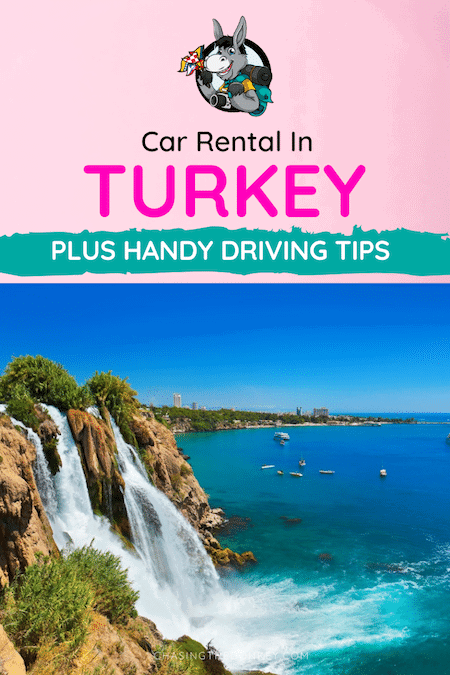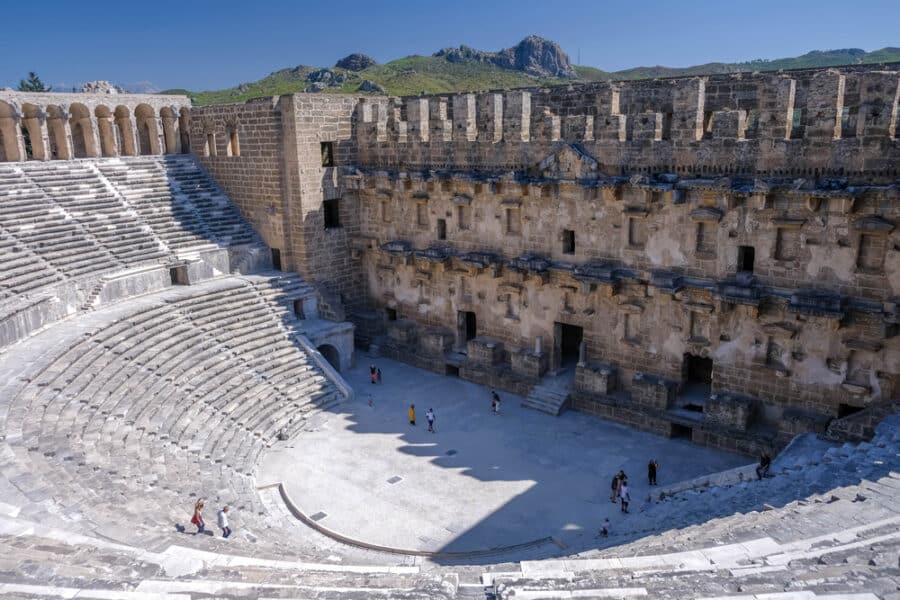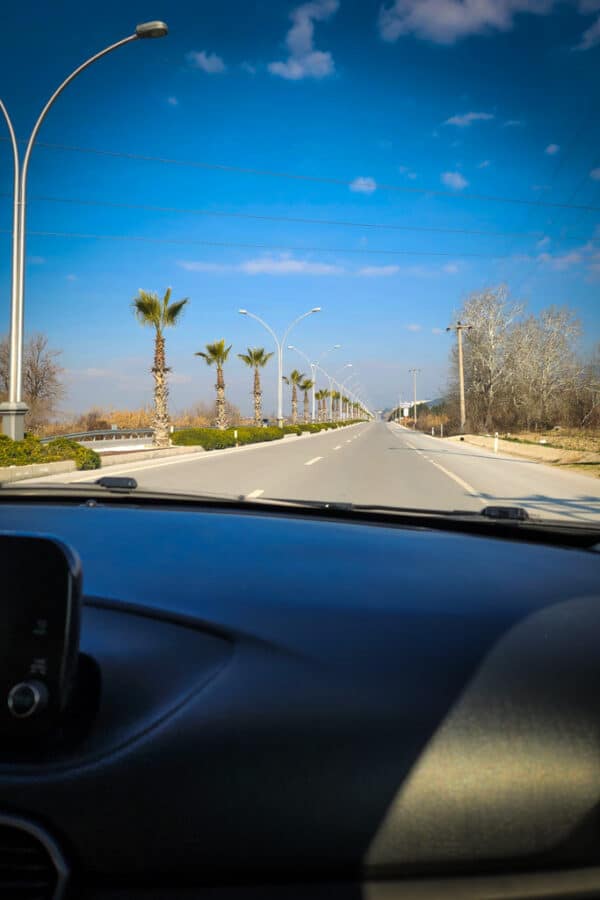Co-authored by SJ, who has undertaken numerous road trips across Turkey, and Nicky, who brings a wealth of knowledge from 12 years of living and driving in the country.
This guide merges their invaluable experiences, offering a comprehensive overview of everything you want to know about driving in Turkey, from navigating Turkish roads to essential car rental tips.
We’ve addressed every frequently asked question you might have, ensuring a smooth and memorable driving experience in Turkey.

Despite the admittedly sheer size of Turkey, you should consider driving in Turkey as your driving in Türkiye is actually pretty easy. If you’re considering visiting Turkey and want to get around on your own steam, you’ll find excellent motorways and beautiful scenery on your road trip in Türkiye.
Turkey has land and sea borders, so it’s possible to travel into Türkiye from Greece, Bulgaria, Georgia, Armenia, and Azerbaijan. You will need your passport and car papers, including insurance and an international driving license.
Many companies in Turkey will not allow you to cross land borders with a hired car. Luckily, there are plenty of fantastic road trips in Türkiye to do, so you won’t have to leave the country in the first place! However, if you plan to rent a car in Turkey, you’ll need to pick up your vehicle in Türkiye and return it before leaving.
Let’s examine hiring a car in Turkey and a few driving tips you should know before arriving.
Skip Ahead To My Advice Here!
Rental Car Companies In Türkiye
The following car rental companies are commonly found in Turkey:
- Enterprise Rent a Car
- Rent Cars Türkiye
- Europcar
- Hertz
- Avis
- Budget
- Green Motion Car Rental
- VIP Cars
- Wish Car Rental
- Sixt Rent a Car
- InterRent
- Thrifty Car Rental
- Circular Car Hire
- Goldcar
- Avento
- First, Rent a Car
You’ll also find countless car hire companies unique to a particular town. These companies usually offer lower prices than some of the bigger companies at airports and in large cities.
Hire Car Tips For Turkey

If you’re thinking about renting a car in Türkiye, which, in our opinion, is the best way to get around Turkey, there are some things you’ll need to know first. Read the travel tips for Türkiye road trips below to be as prepared as possible.
Always Book Ahead Of Time In Large Cities/Airports
You can often visit a car hire office in smaller resorts and find reasonable prices. Still, large cities and airports won’t give you these benefits, and you’ll struggle to find a suitable car or pay a considerable amount for it. It’s better to book online ahead of your visit if possible, especially in large cities.
You May Need To Show A Return Flight Ticket

This isn’t a necessary rule for all car hire companies, but some airport car hire offices (Enterprise, especially) may ask for your return flight ticket before they will rent a vehicle to you. This may be problematic if you’re considering booking your return ticket at the last minute, so be aware.
Car Insurance
Car insurance for minor accidents is typically included in the cost of the car rental. Still, you may also opt to add comprehensive accident insurance as you will be driving in a foreign country, which brings its own risks.
Beware Of One Way Rental Fees
If you want to pick up your car in Istanbul and return it to Izmir, you may find yourself falling foul of one-way rental fees. To avoid this, you must return your vehicle to where you picked it up. Not all companies enforce this rule, but again, it’s something to be careful of.
We hired a car at Denizli airport and dropped it off at Izmir airport two days later after an epic road trip. The rental charge was €85 – and the one-way fee was an added €45.
If you do not plan your itinerary well, these fees can be huge.
Check For Any Prior Damage Before You Take To Rent A Car
Before you accept the car, look carefully to spot any visual damage, note it down, take a photograph, or better yet, record a video of the vehicle and keep this close at hand if you’re somehow blamed for the damage when you return the car.
You’ll Need A Credit Card In Your Name

To hire a car in Turkey, you’ll need to show a credit card in your name. The card will be pre-approved in case of any damage or non-return of the vehicle. You don’t have to pay for the car with this card, but you must have it pre-approved.
Minimum Age To Rent A Car In Turkey
To rent a car in Türkiye, you must be 21, but the driving age is 18.
Refill The Fuel & Clean The Car At The End Of Your Road Trip
When you return the car, ensure it has been refilled and cleaned. If it’s less than complete, you’ll be charged the extra to top it up and probably have a hefty fee, and if it’s filthy, you’ll also be charged. Consider getting a car washed or vacuumed at the gas station before returning the vehicle.
Return Your Car On Time
If you rent your car at 11:00, make sure you return it at the same time (or earlier if possible) on the return date to avoid extra fees. If you think you will be late, call the rental company to let them know, as this may help you avoid any additional charges.
Consider A Campervan
Renting a campervan is becoming more common, especially considering road trips through Turkey can be long. It’s an excellent way to see the country, so if you’re in the mood to drive something a little different, it’s a great option!
Brands We Use And Trust
Tips For Driving In Turkey

Driving Your Own Vehicle
If you are coming to Turkey from neighboring Europe or the UK and want to drive your own car instead of renting, keep these things in mind:
- You must be 18 years old
- Bring your driving license (International Driving Permits are not required unless you plan to be in the country for over three months)
- Please bring the original vehicle registration, which must have the same name on it as your passport and driving license
- Third-party insurance is required, along with the green card that provides proof of it. If needed, you can obtain this insurance at the Turkish border
Basic Traffic Rules
An electronic supervision system monitors Turkey, and cameras will immediately penalize cars found breaking traffic rules by tracing the license holders.
Important traffic rules to remember are:
- Fasten your seatbelt
- Do not cross a red light
- Do not make a turn in areas marked explicitly with no-turn signs
- Vehicles coming from the right, traveling on the main road, or already in a roundabout all have priority
- Do not drive while intoxicated
- Do not use a mobile phone while driving
- Do not drive over the speed limit by 10%
- Do not recklessly overtake on Turkish roads
- Do not park in spaces designated for disabled drivers
Fines
If you break common traffic rules, you may receive a fine. Police officers or cameras can issue fines.
If you receive a fine directly from an officer, you can pay it via PTT (the national post office) or online. We highly recommend getting help from the rental agency before doing so.
If the camera captures your violation, the car plate will be fined, and you can talk with the rental agency about the best way to pay this (usually online).
Local Tip: If you pay fines within 15 days, you receive a discount on your ticket.
Below are some typical fines for violations in Turkish Lira.
- Not using a seat belt: 196 TL
- Crossing a red light: 427 TL
- Using a mobile phone while driving: 427 TL
- Going over the speed limit by 10% to 30%: 427 TL
- Driving over the speed limit by 30% to 50%: 888 TL
- Driving over the speed limit by more than 50%: 1,823 TL
- Parking in a place reserved for disabled drivers: 392 TL
Toll Roads
When driving in Turkey, especially on major highways between large cities, you’ll likely encounter toll roads. The toll system in Turkey is primarily managed through the HGS (Hızlı Geçiş Sistemi), an electronic toll collection system that tracks vehicles via a small device attached to the windshield. This device is mandatory for all cars using these toll roads.
How the HGS System Works
The HGS device automatically registers your vehicle as you pass through toll points, and the toll fees are deducted electronically. For tourists renting a car, the good news is that most rental companies will already have an HGS device installed in the vehicle. The fees you accumulate while driving will typically be charged to your account when you return the car.
However, it’s essential to confirm with your rental company that the car is equipped with an HGS device. Ask how the tolls will be calculated and when you’ll be billed to avoid any surprises later. Some companies might charge you immediately after your trip, while others might include the toll costs in the final bill when you return the car.
Paying Tolls Outside of Major Highways
While the HGS system covers the majority of toll roads, especially around larger cities and major highways, you may also encounter smaller toll roads, particularly in less urban areas. In these cases, you might find toll booths that accept payment via cash or credit card. It’s always a good idea to carry some local currency (Turkish Lira) just in case, as not all booths may accept cards.
Local Tip
Before you hit the road, double-check with your car rental agency to ensure that the HGS device is properly set up and functioning. Also, ask for any specific instructions on how to monitor your toll usage or any additional fees that might apply. Being informed can help you avoid unnecessary fines and ensure a smoother driving experience across Turkey’s toll roads.
Istanbul Traffic

To say that Istanbul’s traffic is a problem does not do it justice. Driving in Istanbul can be a total nightmare; it can take hours to get to where you want to go at certain times of the day. Thanks to faster roads, the Asian side tends to move a little faster than the European side, but that doesn’t mean you’re not likely to get caught up in some traffic at some point.
Avoid between 5 and 7 p.m. on any day of the week, and Saturdays, in particular, are a problem no matter what the time. Also, driving in Istanbul between 8 and 10 a.m. can also be a problem in central areas.
One of the most important pieces of advice we can give you about driving in Turkey is to avoid driving in Istanbul, especially with a rental car. There’s plenty of public transportation available to get around this huge city.
Lack Of Free Parking
There is very little free parking in Türkiye as a whole, but especially in Istanbul; instead, you’ll have to pay for street parking or a use a multi-story car park hourly. Look for the İSPARK signs or use Google Maps to find these locations along the road. Parking officers will give you a receipt after you park, and you can make a cash or card payment with them.
Parking costs vary, but you can expect to pay around 15-20TL per hour, on average.
If you are in an area of Istanbul without İSPARK signs and someone is trying to direct you to a parking space, they are likely part of a parking lot mafia known as “değnekçi,” and you should look for a different place to park.
Parking in other cities is much simpler. Parking lot municipalities and roadside parking are plentiful, so you will not run into the same congestion as Istanbul.
Roundabouts
In most European countries, roundabout rules are the same, with priority going to the vehicle already in the roundabout. However, don’t be surprised to find this rule frequently violated in Turkey.
Even if you are in a roundabout, other drivers (often taxis, buses, and minibusses) will also enter the roundabout at any given moment without waiting for anyone else. While this can feel intimidating, know that it is normal.
Be extra vigilant and careful when entering and driving in roundabouts. Drive at a comfortable speed to you, and, if needed, give way to any impatient vehicle nearby.
Speed Limits In Turkey

Driving limits are in place, and these are “officially” enforced. However, don’t be surprised to find drivers choosing their own speed from time to time. By no means does this mean you should join in on the act, as police can and do stop speeding drivers.
The official speed in towns and cities is 50 km/h; on double-lane roads, it is 90 km/h; on intercity dual roadways, it is 110 km/h; on motorways, it is 120 km/h; and on open roads, it is also 90 km/h.
Note: The 90 km/h refers to highways with oncoming traffic. If there is a central reservation or fence between the two directions of traffic, then the speed is 110 km/h, and on toll roads, the limit is 120 km/h.
Road Quality
Most roads are of good standard throughout the country. You will, however, notice that the more off the beaten path you venture, the rougher the roads become.
In general, motorways and national roads are very smooth, offering the best driving experience.
Gas & Fuel Stations In Turkey
Fueling up in Turkey is straightforward and convenient. Gas stations (known locally as “Benzin istasyonu”) offer full service around the clock. Whether you’re driving through busy urban centers or remote rural areas, most gas stations provide 24-hour service, ensuring that you can refuel whenever necessary.
Full-Service Stations
In Turkey, the majority of gas stations are full-service, meaning you won’t need to leave your car to fill up. Pull up to the pump, and an attendant will handle everything for you. All you need to do is let them know how much fuel you want—whether it’s a full tank or just a specific amount. They’ll take care of the rest, including checking whether your car requires diesel or petrol.
This full-service approach is particularly handy for tourists who might not be familiar with local fuel pumps or prefer not to navigate the process themselves.
Payment Options
Once your tank is filled, paying is just as easy. You can settle the bill directly with the attendant, either in cash or by card. If you prefer to use your card, you might be directed to the station’s convenience store to make the payment. Inside, inform the cashier of your pump number, and they’ll process your payment quickly. This is also an excellent opportunity to stretch your legs and pick up some snacks or beverages for the road.
Convenience Stores
Turkish gas stations often have well-stocked convenience stores that offer a wide range of items beyond fuel. You can grab a quick snack, stock up on drinks, or even find essentials like windshield wiper fluid, motor oil, and other car-related products. Many stations also have clean restroom facilities, making them ideal pit stops during long road trips.
Some larger gas stations might also have small cafes or fast food outlets, allowing you to enjoy a more substantial meal before continuing your journey.
Local Tip
While the quality of service and amenities is generally consistent across the country, it’s a good idea to stop at well-known chains like Shell, BP, or OPET, especially if you’re looking for cleaner restrooms and a broader selection of convenience items. These stations are also more likely to accept international credit and debit cards without issue.
Before setting off on long drives, particularly in more remote areas, it’s wise to refuel whenever you get the chance, as gas stations can be sparse in some regions. Additionally, don’t hesitate to ask the attendants for directions or recommendations—they’re usually very helpful and familiar with the local area.
Dealing With The Police In Turkey
While driving in Turkey, it’s not uncommon to encounter police roadblocks or be pulled over for routine checks. The Turkish police are generally polite and professional, but there are a few things to keep in mind to ensure a smooth interaction.
Routine Checks
Police roadblocks are a regular sight, especially on major highways and near city borders. These checks are often set up to ensure road safety and compliance with traffic regulations. If you encounter one, remain calm and follow the officer’s instructions. They might ask for your identification, driving license, vehicle registration, and insurance documents. It’s important to have these documents easily accessible in your vehicle at all times.
Language Barrier
If you’re not fluent in Turkish, don’t worry—many officers speak at least some English, especially in tourist areas. However, it’s usually best to talk in English if you’re unsure about your Turkish skills. In most cases, showing your passport and being polite will help the situation go smoothly.
Common Situations
Traffic Violations: If you are stopped for a traffic violation, the officer will likely issue a fine on the spot. You can pay the fine at a nearby PTT (Post Office) or online. Paying within 15 days often results in a discount on the fine.
Alcohol Checks: Turkey has strict laws against drinking and driving. The legal blood alcohol limit is 0.0%, meaning you should not have any alcohol in your system while driving. Random breathalyzer tests are standard, particularly at night. If you’ve consumed alcohol, it’s best to avoid driving entirely.
Speeding: Speeding is another common reason for being pulled over. Turkey’s highways are monitored by both police and automated systems that issue fines for speeding. If you receive a fine from an automated system, it will be sent to the vehicle’s registration, which your rental company will forward to you.
Local Tip
If you do encounter any issues, remember to stay calm and respectful. If language becomes a barrier, using translation apps on your phone can help clarify the situation. Always carry a valid international driving permit (if required) and ensure all your documents are up to date. For any serious incidents, consider contacting your car rental company for assistance or even a local lawyer who specializes in helping foreigners.
Final Word
Driving in Turkey offers a unique way to explore this diverse and beautiful country. Whether you’re navigating the bustling streets of Istanbul or enjoying the open roads in the countryside, having a car gives you the freedom to see more at your own pace.
While there are some quirks and challenges, like dealing with tolls or adapting to local driving habits, these are all manageable with a bit of preparation. Remember to stay patient, be aware of your surroundings, and, most importantly, take time to enjoy the journey.
Whether you’re here for a quick trip or planning an extended road adventure, driving in Turkey can be a rewarding experience that lets you discover places and experiences you might otherwise miss. Safe travels, and enjoy the ride!
Turkey Car Rental FAQs
Is it safe to drive in Turkey?
Yes, driving in Turkey is generally safe. While Turkish drivers can be assertive, road conditions are good, and road rules are similar to those in other countries. However, it’s important to stay alert and follow local driving practices.
What do I need to know when driving in Turkey?
When driving in Turkey, you should have a valid driver’s license, either an international driver’s permit or a driver’s license from your home country. Familiarize yourself with Turkish road rules, signage, and limits to ensure a smooth trip.
Do I need an International Driving Permit to drive in Turkey?
If you have a valid driver’s license from your home country, you do not need an international permit to drive in Turkey, which will allow you to explore the country with ease.
What are the road signs like in Turkey?
Road signs in Turkey follow international standards and are generally clear and easy to understand. They are displayed in both Turkish and English, making navigation straightforward for tourists.
What are the speed limits in Turkey?
Speed limits in Turkey vary depending on the type of road. As a general guideline:
- Residential areas: 50 km/h (31 mph)
- Open roads: 90 km/h (56 mph)
- Expressways: 120 km/h (75 mph)
- Motorways: 130 km/h (81 mph)
What should I know about traffic lights in Turkey?
Pay attention to traffic light positioning in Turkey. They are sometimes placed on the side of the road instead of above it. This ensures better visibility for drivers and helps prevent delays.
What are some common road hazards in Turkey?
While driving across Turkey, be aware of pedestrians, particularly in busy urban areas. Also, watch out for aggressive driving behavior from some Turkish drivers and exercise caution at checkpoints.
Is taking a road trip the best way to see Turkey?
Absolutely! Turkey is a unique and diverse country with a big tourist potential. A road trip allows you the freedom to explore different regions, discover hidden gems, and visit a wide range of tourist attractions.
Do I need to plan my itinerary in Turkey beforehand?
It is recommended that you have a rough idea of your Turkey itinerary. Plan your desired destinations and approximate travel times between them to make the most of your road trip experience.
Do I need to pay tolls when driving in Turkey?
Yes, the HGS toll system is used on many motorways in Turkey. Rental cars are usually equipped with the necessary toll device, but it’s best to confirm with your rental agency.
Is parking easy to find in Turkey?
Finding parking spaces can sometimes be a challenge in busy city centers and old towns with narrow lanes. It’s advisable to park on the outskirts and use public transportation or walk to explore these areas.
Can I rent a car in Turkey?
Yes, car rental services are available across Turkey. Ensure you have a valid driving license and follow the rental company’s requirements and policies.
Is it safe to rent a vehicle in Turkey?
Yes! Renting a car in Turkey is as safe as in Europe. Security cameras are widespread in big cities, and police patrol traffic, providing a safe driving environment.
Should I rent a car in Turkey?
This depends on your itinerary. For visiting Istanbul, public transport might be preferable due to congestion; for other destinations like İzmir, Çeşme, Ankara, or Pamukkale, renting a car is ideal. For distant locations, consider flying there and then renting a car.
What is the minimum age for renting a car in Turkey?
The minimum age to rent a vehicle in Turkey is 21.
What kind of payment can I use to rent a car in Turkey?
Most reputable car rental companies in Turkey accept only credit cards. Avoid companies that only accept debit cards or cash.
What documents are needed to rent a car in Turkey?
To rent a car, you’ll need an ID or passport, a driver’s license, and a credit card issued in your name.
Can I add an additional driver to the rental?
Yes, you can add an additional driver, though there may be a daily fee for this service.
On which side of the road do cars drive in Turkey?
Cars drive on the right-hand side of the road in Turkey.
Should I bribe the police if I get pulled over?
No, do not attempt to bribe the police. Bribery is illegal in Turkey and can lead to severe penalties. Pay any fines through the proper channels.
Are there any unique aspects of local driving I should be aware of?
When driving in Turkey, be cautious of aggressive driving behavior, particularly in busy urban areas. Familiarize yourself with local road etiquette, remain courteous, and avoid engaging in confrontations on the road.
What are some things I should consider before driving in Turkey?
Before driving in Turkey, ensure you have a valid driving license and familiarize yourself with Turkish road rules, signage, and speed limits. It is also advisable to plan your itinerary and be prepared for road conditions and potential hazards.
Can you please summarize the benefits of a road trip in Turkey?
Driving in Turkey allows you to explore the country at your own pace, discover hidden treasures, and visit various tourist attractions. It gives you the flexibility to create a personalized itinerary and experience the diverse landscapes and cultural richness of Turkey.
Move This Adventure To Your Inbox & Get An Instant Freebie

No spam. Unsubscribe at any time.
Final Thoughts On Driving In Turkey

Turkish driving manners can be, shall we say… assertive. There are some crazy drivers in Türkiye, but the same can be said for any country. The roads are high quality and, for the most part, extremely safe. However, you will need to stick to speed limits and always wear a seatbelt, even if local drivers don’t occasionally do the same.
If you follow all these tips for driving in Turkey, traveling by car is easily the best way to get around Türkiye. After all, nothing offers the sheer amount of freedom and flexibility that your own set of wheels can provide while sightseeing and following your own itinerary.
Driving in Turkey shouldn’t be avoided, as it’s a great way to get around and see more, but you must be cautious and follow the rules.
- How To Road Trip In Turkey
- Fethiye To Marmaris Sea Bus Services
- How To Get From Antalya To Cappadocia
- How To Get From Istanbul To Cappadocia
- How To Get From Pamukkale To Cappadocia
- How To Get From Izmir To Pamukkale
- How To Get From Istanbul To Konya
- Antalya To Kas Route Options
- Turkey Digital Nomad Visa & How To Apply


this is useful and important because this is vital part of travel in turkey
There is lots of good advice here however the speed limits are wrong. The 90kph refers to highways with oncoming traffic. If there is a central reservation or fence between the two directions of traffic then the speed limit is 110kph and on Toll roads the limit is 120kph.
I’ve drive thousands of kilometers in Turkey and have received a few fines along the way. 🤣 They are generally cheaper than western countries.
The OP has also missed another very important point. Back home we are used to the rules of priority being followed, here however drivers will go if they think that they can make it, such as at a junction or even a red traffic light. So be prepared to avoid the impatient drivers.
The speed cameras here tend to be of the Average speed between 2 points variety. They clearly mark on them the distance between the 2 points. So maintain the limit or below for the duration. Again these are mostly in Istanbul and outside the tourist cities on the highway. You will find very few inside the cities outside istanbul. Most of the EDS cameras in the city are for red light jumpers but again these are few. The cameras are clearly marked with EDS on the road and with signage. The police themselves if speed trapping must put a sign on the road before the trap. This will be a small triangle usually at ground level.
If your a foreigner and speak english at roadblocks generally the police will waive you through, some will glance your licence , however the Jandarma (Special Police) will normally check your passports also to ensure you have been in the country less than 6 months.
Thanks Adam, I’ll be sure to amend the speed limit info that Nikki wrote.
Hi, Thanks for the useful tips
How much time and money can we save by avoiding toll road.
Is it worth? Is it safe?
Plz let me know.
Thx